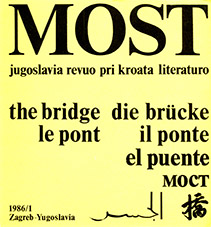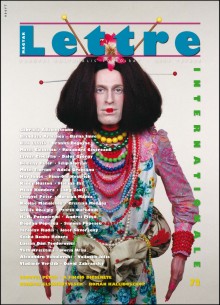
»Восемь лет в Варшаве« Юлия Бенешича на польском языке
Julije Benešić's "Eight years in Warsaw" in Polish
More...We kindly inform you that, as long as the subject affiliation of our 300.000+ articles is in progress, you might get unsufficient or no results on your third level or second level search. In this case, please broaden your search criteria.

Julije Benešić's "Eight years in Warsaw" in Polish
More...
Le concept de culture nationale est indissociable de celui de nation. Son sens varie d'une nation à la autre et egalement, au sein d'une meme nation selan le mode d'evolution de celle-ci et de son stade de developpement. Ce qui differencie de nos jours les definitions de la culture nationale, c'est d'une part, la reference plus ou moins etroite aux concepts traditionnels de nation, herites du siecle dernier (comme etant en tout plus ou moins homogene, dote des fonctions unificatrices et generatrices d'un Etat), ou d'autre part, la prise en considerations des contradictions (sociales, culturelles, de classe) communautes nationale memes.
More...
Als Schriftsteller schrieb Cesarec Romane, Novellen, Essays, Reisebeschreibungen und Dramen, doch als Romancier und Novellist war er am erfolgreichsten. Stark beeindruckt von Dostojewski drang Cesarec leidenschaftlich in die psychologischen Zustände seiner Figuren ein und führte ihre Schicksale zu solchen Lösungen, wie sie die Prämissen des Lebens auferlegten. Unerschütterlich und konsequent in seinem Wirken von der Oktoberrevolution bis zu seinem Tod sah Cesarec in der Dritten Internationale die Verwirklichung seiner revolutionären Pläne, die von der Pariser Kommune bis zu Lenin reichten, wie sein Freund und Mitkämpfer in der literarischen Linken Miroslav Krleza sagte.
More...
Après la mort d'un poète son oeuvre litteraire survit. Bien que Marijan Matković (1915-1985) ait laissé sciemment bon nombre d'ouvrages non publiés et assuré ainsi sa survie parmi nous (drames: Bošković à Paris , Stalingrad etc...), puis de nombreux journaux, souvenirs notes, tout simplement "des pas sur le sentier" comme il a appelé lui - meme sa biographie littéraire, sa présence est néanmoins assure par son oeuvre littéraire publie, variée, d'actualité a significations multiples
More...









The cult of Dionysus came to the Hellenists from Trakia and Macedonia1 and according to some, it originates from Asia Minor2. The myth about the torn apart child Dionysus – Jagerus was made known by Christian authors3. On Hera’s command, the newborn son of Zeus was torn apart by the Titans, and a tree sprout immediately on the ground where his blood dropped. The Titans placed the torn body into a cauldron and boiled him. But the goddess Rhea put the pieces back together and brought him back to life. Later on, by the order of his father Zeus, through Hermes, Dionysus was transformed into both a goat and a ram, and was given to the care of the nymphs in one of the caves on the hill of Nis. The Epicurean Philodem, from Cicerone’s time, talked about the tree births of Dionysus, i.e.: the first of a mother, the second of Zeus’ hip bone, similar to the Hittite god of the winds born in Kumbaya – where any existence of a mother was excluded. This ceremonial birth, of male sex only, is a well know Jewish ceremony borrowed from the Hittites (Book of Ruth 3:9)4. The third birth of Dionysus was when his grandmother – the goddess Rhea saved the heart of the torn child and joined the pieces together. In this „crime of the Titans“ the old scenario through which the child was given a divine immortality can be recognized. Also, the most dramatic episode of the myth is the tearing and the boiling part. The passing of the human body through fire and it’s metamorphosis also represents an initiation ceremony through which immortality was achieved. The tearing, boiling or passing through fire was a feature of the Shaman initiation.
More...
Во современата литературна култура мошне е раширено уверувањето дека иронијата и парадоксот се во голема мерка сродни. Ова се должи на големото значење коешто, во современите вреднувања на литературата, и’ се припишува на употребата на јазикот. Се чини дека иронијата и парадоксот ги отелотворуваат оние видови на јазично бунтовништво, иновација, девијација и игра, коишто во текот на ова столетие станаа доминантни критериуми на литературната вредност. Поврзувањето на иронијата со парадоксот, и на обете со литературата, честопати и’ се припишува на „Новата критика“, а особено на Клинт Брукс (Cleants Brooks). Сепак, Брукс ги употребуваше овие два термина на еден неконвенционален, дури и ексцентричен начин, кој значително се разликува од нивната употреба во теоријата на фигурите. Затоа јас ги испитувам иронијата и парадоксот како вербални фигури, одбележувајќи ги нивните карактеристични одлики и критериуми, а особено начинот на кој тие се разликуваат една од друга (на пример, парадоксот сака да го каже токму она коешто го кажува, а со иронијата тоа не е случај). Јас го застапувам гледиштето дека иронијата и парадоксот - како што ги сфаќаше Брукс - поседуваат значајна блискост со иронијата и парадоксот како фигури, но дека мораат да се сметаат за различни, како во теоријата на фигурите, така и во Бруксовата проширена смисла.
More...
In contemporary literary culture there is a widespread belief that ironies and paradoxes are closely akin. This is due to the importance that is given to the use of language in contemporary estimations of literature. Ironies and paradoxes seem to embody the sorts of a linguistic rebellion, innovation, deviation, and play, that have throughout this century become the dominant criteria of literary value. The association of irony with paradox, and of both with literature, is often ascribed to the New Criticism, and more specifically to Cleanth Brooks. Brooks, however, used the two terms in a manner that was unconventional, even eccentric, and that differed significantly from their use in figurative theory. I therefore examine irony and paradox as verbal figures, noting their characteristic features and criteria, and, in particular, how they differ from one another (for instance, a paradox means exactly what it says whereas an irony does not). I argue that irony and paradox — as understood by Brooks — have important affinities with irony and paradox as figures, but that they must be regarded as quite distinct, both in figurative theory and in Brooks’ extended sense.
More...
Дионизискиот култ кај Елините доаѓа од Тракија и Македонија,1 а според некои мислења се смета дека има малоазиско потекло2. Митот за распарчувањето на детето Дионис – Загреј, познат е, пред сè, благодарение на христијанските автори.3 По заповед на Хера, новородениот Зевсов син е растргнат од страна на Титани, а таму каде што на земја паднала неговата крв, веднаш изникнало дрво. Распарченото тело титаните го ставиле во лонец и го свариле. Меѓутоа, божицата Реа повторно го составила и го повратила во живот. Подоцна, по наредба на таткото Зевс, од страна на Хермес, Дионис е претворен, час во јаре, час во овен и даден е на чување кај нимфите, во една пештера на ридот Нис. Епикуреецот Филодем, Цицеронов современик, зборува за три Дионисови раѓања и тоа: првото од мајка, второто од бедрената коска на Зевс, слично на Хетитскиот бог на ветровите, роден од Кумабаја – каде е исклучено секакво постоење на мајка. Ова обредно раѓање само од машки пол е позната обредна церемонија, позајмена од Хетитите (Книга за Рут III, 9).4 Третото раѓање на Дионис е кога неговата баба – божицата Реа, го спасува срцето на растргнатото дете и ги составува распарчените делови. Во овој „злочин на титаните“ се препознава старото сценарио преку кое на детето му е дадена божествена бесмртност. Тоа е и најдраматичната епизода на митот каде, освен парчење, е применето и варење. Ова преминување на човечкото тело низ оган и негова метаморфоза, претставува иницијациски обред, со кој се постигнува бесмртност. Самото кинење, печење или преминување низ оган, е карактеристичен процес и за шаманските иницијации.
More...

It was a winter night. The heating system did not work. Electricity went off very often. The people came in, peeped through the door, and seeing that there were not many people inside, closed it. It was the middle of the week. Wednesday. One of those Skopje winter months. Skopje has many winter months. The bar looked sad, dominated by yellow light. That felt good. Like relief from the fog. Or more precisely, something that only seemed like relief from the fog, as there is no relief from the Skopje fog. The light in the bar was a kind of deception. But sometimes even that is enough. But this evening it was not enough. I drank beer, drifting in and out of the music, making occasional small talk with the people inside, and I smoked like a prisoner on death row. In the middle of the middle of the week.
More...